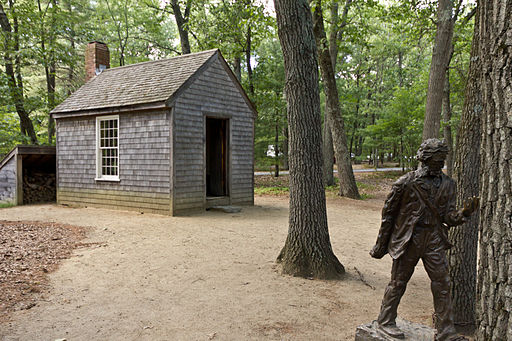Henry David Thoreau was born into the lower economic status, but because of his natural intelligence, his family chose him to attend Harvard University. This is where he met the famous transcendentalist philosopher Ralph Waldo Emerson. It was in 1836 when the two transcendentalists met. Emerson would later become Thoreau’s good friend and mentor. Thoreau, looking up to Emerson, would be inspired by his transcendentalist ideals and would start his own works inspired by Emerson’s original thoughts.
Unlike most writers, including his mentor, Thoreau took to a different genre of writing. Thoreau chose to express his literature through journal writing. Through that form of writing, he was able to express his different philosophies and beliefs. Thoreau’s beliefs consisted of one’s need for constant self-improvement and self-sufficiency. He also took the notion that traveling should never be for self exploration, but should be about learning from different cultures. Thoreau’s slightly more radical beliefs were that slavery went against the entirety of the transcendentalist ideals. Thoreau took this belief as far as not paying his taxes out of an act of protest against the fugitive slave act. These actions put him in jail for a short amount of time. Thoreau’s stance on slavery would issue him into the beginning of the reform era.

Thoreau wrote his most famous piece Walden: Life in the Woods in 1852. Walden: Life in the Woods was based on his own life and his decision to live out in the wilderness in the house that he built himself. Thoreau promoted his life choices in Walden, describing it as what should be the norm for everyone to live. His passion in his lifestyle shows that Thoreau’s intended audience was not only for his fellow transcendentalist; but also for the general population. Thoreau used Walden: Life in the Woods to show them how to change the way they are living, consuming, and going into debt over “frivolous” things.
In Walden: Life in the Woods Thoreau throws out complex ideas, that weren’t explained properly on how to execute in life. Thoreau’s complex thinking in Walden can be found when Thoreau explains the value of education in his first chapter Economy. He expresses that going to college is valuable for the experience. Thoreau argues that you actually learn from being around intellectuals and not by going to classes (Thoreau 1006). He especially denounces paying the expenses to live in a dormitory. However, Thoreau never explains to his readers how they should go about learning and valuing their education; without paying or going through a college course. The presenting of ideas without a way to execute it in life was just one issue that was found in Thoreau’s Walden.
Walden was an influential work that was slightly flawed. A major issue within Thoreau’s ideology in Walden was that he wasn’t truly self-sufficient. Thoreau had a lot of assistance and advantages that he didn’t really address in Walden. These advantages allowed for the lifestyle Thoreau spoke of to be more attainable for him but not so much for his audience. Thoreau unlike some was able to receive assistance from his good friend Emerson. Emerson allowed Thoreau to build his house on his land. Another advantage Thoreau had was his ability to obtain a loan. During his time there were many people, mainly minorities who this luxury was completely unattainable. However, Thoreau does not address any of his privilege or advantages in Walden.
Works Consulted
Levine, Robert, and Arnold Krupat. Norton Anthology American Literature.
Edited by Nina Baym, 8th ed., B, W W Norton & Co Inc., 2007.
Thoreau, Henry David. Walden: Life in the Woods. Ticknor and Fields, 1854.